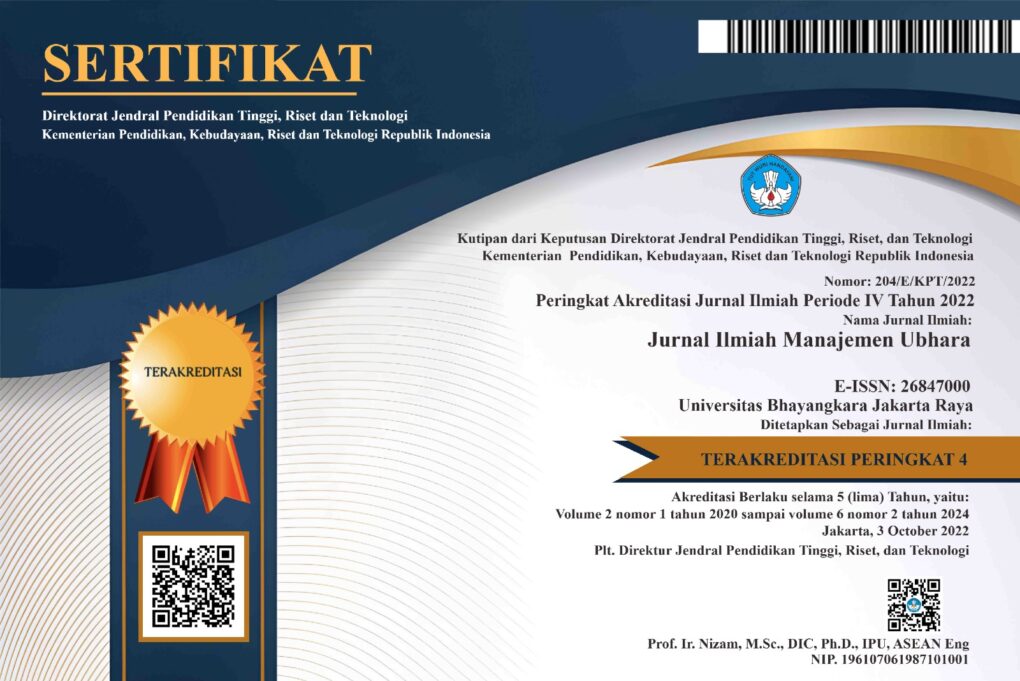Publication Ethics
This publication ethics statement is established to ensure that the publication process in the Journal of Management Science Ubhara (JIMU) is conducted ethically, transparently, responsibly, and in accordance with international standards. These ethical guidelines apply to all parties involved in the publication process, including authors, editors, reviewers, and the publisher.
1. Authors’ Responsibilities
-
Originality and Scientific Integrity
-
Authors must ensure that the submitted manuscript is original, free from plagiarism, and has not been previously published or under consideration by another journal.
-
All data presented must be accurate, valid, and obtained through ethical methods.
-
-
Citations and References
-
Authors must appropriately cite all sources that have influenced their research.
-
Use of data, images, or text from other authors must include proper permission and citation.
-
-
Authorship Criteria
-
Only individuals who have made significant contributions to the research may be listed as authors.
-
The corresponding author must ensure that all co-authors have reviewed and approved the final manuscript.
-
-
Disclosure of Conflicts of Interest
-
Authors must disclose any potential conflicts of interest, such as funding sources or professional relationships that may influence the research.
-
-
Corrections and Retractions
-
If authors discover significant errors in their published work, they are obliged to promptly notify the editor to revise or retract the manuscript.
-
2. Reviewers’ Responsibilities
-
Confidentiality
-
Manuscripts submitted for review must be treated as confidential documents and not shared or used for personal purposes.
-
-
Objectivity
-
Reviewers must provide objective, scientific, and constructive evaluations, free from personal bias or conflicts of interest.
-
-
Timeliness
-
Reviewers should complete the review process within the assigned time. If unable, they must notify the editor immediately.
-
-
Constructive Feedback
-
Reviewers should offer clear, meaningful, and constructive comments to help authors improve their manuscripts.
-
-
Avoiding Conflicts of Interest
-
Reviewers must decline the review if they have conflicts of interest with the authors or the research.
-
3. Editors’ Responsibilities
-
Publication Decisions
-
Editors are responsible for deciding whether a manuscript is accepted, revised, or rejected based on scientific merit and reviewer evaluations.
-
-
Fairness and Objectivity
-
Editors must ensure fair and unbiased evaluation, free from discrimination based on gender, religion, ethnicity, nationality, or institutional affiliation.
-
-
Confidentiality
-
Editors must not disclose any information about submitted manuscripts except to authors, reviewers, or authorized editorial staff.
-
-
Managing Conflicts of Interest
-
Editors must ensure that manuscripts with potential conflicts of interest are not handled by editors or reviewers who may be affected.
-
-
Integrity of Publications
-
Editors are responsible for maintaining the scientific quality of published articles and handling ethical issues appropriately.
-
4. Publisher’s Responsibilities
-
Maintaining Publication Integrity
-
The publisher must ensure that the publication process adheres to ethical standards and COPE guidelines.
-
-
Supporting Academic Freedom
-
The publisher supports the editorial team, reviewers, and authors in maintaining independence and academic integrity.
-
-
Ensuring Accessibility
-
The publisher must ensure long-term online availability and accessibility of all published articles.
-
5. Ethical Misconduct
Violations such as plagiarism, data fabrication, duplicate publication, citation manipulation, or undisclosed conflicts of interest may result in:
-
Manuscript rejection
-
Retraction of published articles
-
Restriction of future manuscript submissions
-
Notification to the author’s institution
6. Originality and Anti-Plagiarism Policy
JIMU uses plagiarism detection software. Manuscripts with a high similarity index will be rejected. Authors must ensure that the manuscript meets the journal’s acceptable similarity threshold.






_-_Copy1.jpg)
